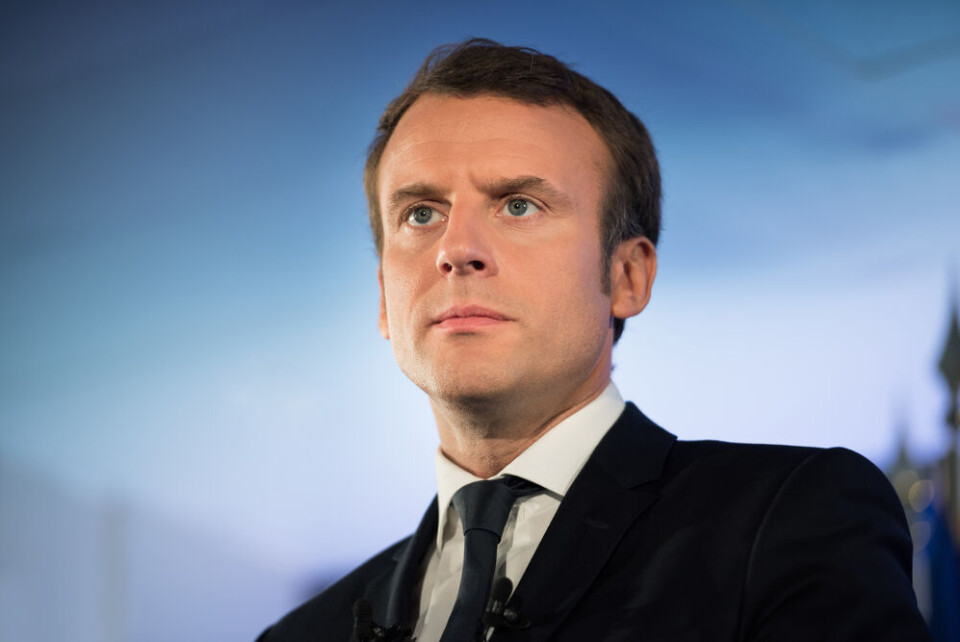-
Becoming a cashless society would not solve France's problems
Economic historian Patrice Baubeau says the trend is accelerating
-
Is it ever right to blend red and white wine?
Readers contribute to French wine snobbery debate
-
My experience on Brittany Ferries' new boat was lacklustre
A reader writes of his experiences with the company
Massive shows of police strength suit Macron for re-election bid
No modern French politician has ever lost an election by being too tough on security, says Nabila Ramdani in her monthly column

Getting caught up in vast clouds of tear gas on the Champs-Elysées is not the ideal way of spending an otherwise sunny Saturday afternoon in Paris.
Noxious chemical fumes covered the most famous avenue in France while I was sitting down for coffee during yet another political demonstration against President Emmanuel Macron’s administration.
Café windows were being smashed and there were lots of loud bangs caused by gas canister launchers. Soon I was joining dozens of terrified people trying to flee the worst of the violence. They ranged from tearful young children to the old and the handicapped. Paramedics were rapidly on the scene, treating those who were in the most serious difficulty.
Up until the start of the coronavirus pandemic, Saturdays had pretty much become institutionalised riot days in the capital, mainly thanks to the legacy of the gilets jaunes anti-government movement.
They began smashing up the Champs-Elysées in late 2018, desecrating monuments including the Arc de Triomphe as they also caused millions of euros worth of damage to nearby restaurants, banks and designer boutiques.
Read more: Paris police ban anti-vaccine pass ‘freedom convoy’ as hundreds on way
What was odd about the latest round of intense violence, however, was that there were hardly any protesters anywhere. Instead, legions of riot police, including the CRS, roamed at will, discharging gas canisters and hitting out with batons. There were even armoured cars on the streets, giving the impression of a paramilitary state of emergency.
All were nominally trying to stop a ‘Freedom Convoy’ – hundreds of cars and trucks demonstrating against restrictions to normal life caused by Covid-19. But very few of the vehicles had actually got into the city, because of an official ban supported by police roadblocks. Those that did reach the roundabout around the Arc were soon stopped, leaving protesters on the pavement to shout ‘Liberty!’, but they did little else. There was hardly any sign of the usual disorder, let alone costly attacks on property.
Instead, it seemed to me that President Macron had placed 7,000 police and gendarmes around the city to make a point about law and order. All appeared to be under orders to be as active as possible. This is undoubtedly the main reason why innocent people were being hurt.
Read more: Freedom Convoys: Fines, arrests, and tear gas amid arrival in Paris
No modern French politician has ever lost an election by being too tough on security, and President Macron is hoping to be re-elected as head of state this April. He is up against some ferociously reactionary opponents, including Marine Le Pen and Eric Zemmour, and he needs to show that he means business.
Both Le Pen, of the far-Right National Rally, and the even more extreme Zemmour, who calls his movement Reconquest, regularly accuse Macron of letting the criminals, including insurgents, win.
This is why Macron has pledged to double the number of police in France (there are currently around 150,000) and pump a record €15 billion into fighting crime if he gets another five years in office.
Such ambitious promises require strong justifications, and what better than to force mass confrontations with relatively minor groups such as the Freedom Convoy drivers, knowing the dramatic images will appear on news footage around the world.
Read more: ‘Freedom convoy’: 7,200 police ready for Paris arrival tomorrow
Interior Ministry estimates put the Convoy participants nationwide at under 140,000 on the February Saturday when I saw them in action, with less than 7,000 in Paris itself.
The main pictures to come out of the day were of uniformed agents at the sharp end of French government. It may have been contrived, and it was certainly frightening for many who were there in person, but in electoral terms the street theatre was undoubtedly worth huge amounts of votes to a Macron campaign that knows exactly how to win modern elections.
Related stories:
At last, France’s honours system rewards a hero (albeit belatedly)...
Opinion: ‘France now has more political parties than types of cheese’
Opinion: 'Top Cop' Macron changing tack in bid for reelection
























